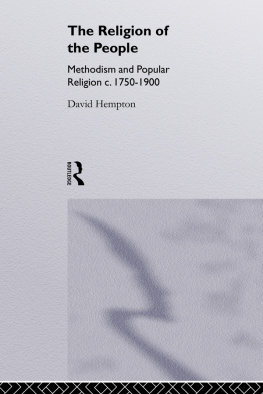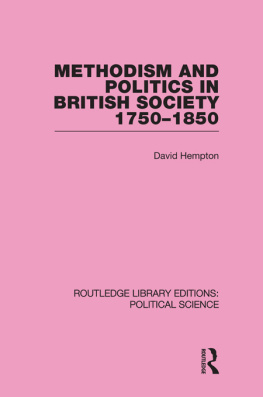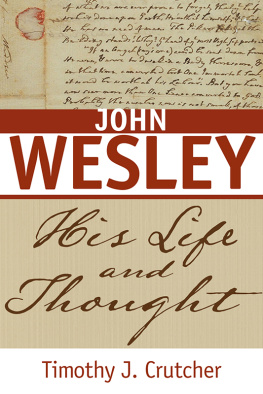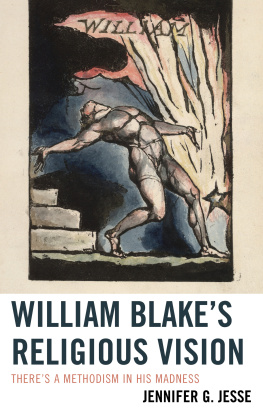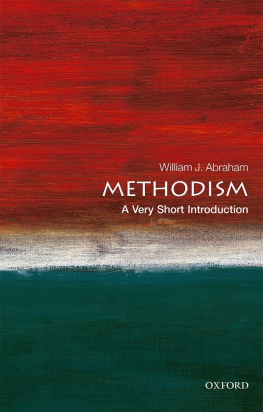WESLEY
AND THE PEOPLE
CALLED METHODISTS
WESLEY
AND THE PEOPLE
CALLED
METHODISTS
Second Edition
RICHARD P. HEITZENRATER

WESLEY AND THE PEOPLE CALLED METHODISTS, SECOND EDITION
Copyright 1995, 2013 by Abingdon Press
All rights reserved.
No part of this work may be reproduced or transmitted in any form or by any means, electronic or mechanical, including photocopying and recording, or by any information storage or retrieval system, except as may be expressly permitted by the 1976 Copyright Act or in writing from the publisher. Requests for permission can be addressed to Permissions, The United Methodist Publishing House, P.O. Box 801, 201 Eighth Avenue South, Nashville, TN 37202-0801, or e-mailed to .
This book is printed on acid-free paper.
Library of Congress Cataloging-in-Publication Data
Heitzenrater, Richard P., 1939
Wesley and the people called Methodists / Richard P. Heitzenrater.
p. cm.
Includes index.
ISBN 978-1-4267-4224-8 (book - pbk. / trade pbk. : alk. paper) 1. Wesley, John, 1703-1791. 2. Methodist Church. I. Title.
BX8495.W5H436 2012
287.09033dc23
2012025698
Unless otherwise noted, all Scripture quotations reflect John Wesleys own patterns of use, and are from the Authorized (King James) Version of the Bible or from the Psalter in The Book of Common Prayer.
Appreciation is extended to the following institutions for permission to reproduce illustrations on the listed pages:
St. Michaels Church, Stanton Harcourt, David M. Rubenstein Rare Book & Manuscript Library, Duke University.
Coalbrookdale, David M. Rubenstein Rare Book & Manuscript Library, Duke University.
John Wesley, David M. Rubenstein Rare Book & Manuscript Library, Duke University.
Bridwell Library Special Collections, Perkins School of Theology, Southern Methodist University.
Reproduced with permission from the Methodist Collections at Drew University.
Courtesy of Hargrett Rare Book and Manuscript Library / University of Georgia Libraries.
Philip Loutherbourg, A Midsummers Afternoon with a Methodist Preacher, 1777, National Gallery of Canada at Ottawa
Reproduced by courtesy of the University Librarian and Director, The John Rylands Library, The University of Manchester.
The British Library Board. Maps K.TOP.37.32.
13 14 15 16 17 18 19 20 21 2210 9 8 7 6 5 4 3 2 1
MANUFACTURED IN THE UNITED STATES OF AMERICA
In memory of my mother and father,
who personified in their life and faith
the Wesleyan heritage of
the people called Methodists

Contents
Prefatory Comments to the Second Edition
This work has gone through a continual process of testing and suggestion over the last twenty-five years. Many pastors and teachers of United Methodist studies have been asked why and how the book could be most useful for them and, with their parishioners and students, have become sources of suggestions, criticisms, and corrections. The book has been reprinted many times in two decades, including translations into Portuguese, Bulgarian, Russian, Spanish, German, and Korean. Apart from a few corrections over the years, the text remained virtually the same.
The current revised edition, however, entails many significant revisions and emendations, based on twenty additional years of research, teaching, thinking, reading, publication, and lecturing. Some small changes involve the choice of words or phrases; others have meant changing whole sentences or paragraphs. The same is true with the additions, which range from single words to whole sentences or paragraphs. Several new topics are introduced into the flow of the story, which in some cases also meant adjusting the material on either side of the new topics.
Although the bibliographical suggestions reflect the addition of some more recent and supplemental sources, embedded references rather than footnotes continue in this text. While some common and easily found information and quotations are not even documented, the reader should take the references seriously, as they often point to additional material that fleshes out many points touched on only briefly in the text. Many recent studies are collections of articles and essays that contain a wealth of information and go into much more detail than can even be fully summarized in this survey.
The changes reflect not only the development of my own insights over the last several years but also much of the new work done by many others who have made significant contributions to the field of Wesleyan studies in the last two decades. Being asked to produce a revised edition is a great blessing that is not often experienced by a student of any subjectit is like having the chance to rewrite and improve a term paper that was originally turned in to meet an artificial deadline. For this new opportunity to express some later thinking in areas that have consumed my whole life, I give hearty thanks.
R. P. H.
The Divinity School
Duke University
August 15, 2012
Preface to the First Edition
Every account of origins is laden with myths and legends. Christianity is said to have been brought to England by Joseph of Arimathea, who placed his staff in the ground at Glastonbury and said, This is the place. The rod supposedly sprouted into a tree. It is a tribute to human credulity that the guidebooks to Glastonbury today locate the living descendent of that tree with the same confidence that they point out the location of King Arthurs grave, both within the confines of the medieval abbey ruins.
John Wesley is much closer to us in time, of course, than Joseph or Arthur, but the story of his influence on English religion is not untouched by twice-told tales that have at times taken on the easy ring of truth. Wesley himself was anxious to be the historian of his own movement. Who is more suited to the task? he asked his readers. But his usual intent was as much to defend as to describe the people called Methodists and his role in their rise and development. His detractors quite naturally were more interested in painting a dark picture of the movement and cannot be accused of attempting an accurate portrayal of its rise and design. Wesleys friends unabashedly put the best side forward in describing Methodism and its leader. We discover, in sifting through the vast amount of material left to us by Wesley and his contemporaries, that it is fairly easy to distinguish attack from defense, or diatribe from devotion. It is not always so easy, however, to disentangle propaganda from polemic, or fact from fantasy, on either side of the fence.
Wesley was self-conscious of his own spiritual and theological development; he was equally concerned about the religious and intellectual pilgrimage of his followers. We must remember that the story of the Wesleyan movement in the eighteenth century is more than a description of a spreading organization, a developing theology, and a widening mission. It is the story of the people called Methodists for whom and with whom Wesley spent his time and energy. Therefore, many individuals are mentioned by name in this survey who traditionally have not been considered significant enough to mention but in many ways could be considered the main participants in the story of Methodisms development.
Part of our task in reviewing the early history of the Wesleyan revival is to recognize the roots both from which the movement sprouted and upon which it relied for continuing nourishment. Wesley, in his later reflections upon the rise and growth of Methodism, emphasized the spontaneity of its origins and the open-endedness of its development (see his


